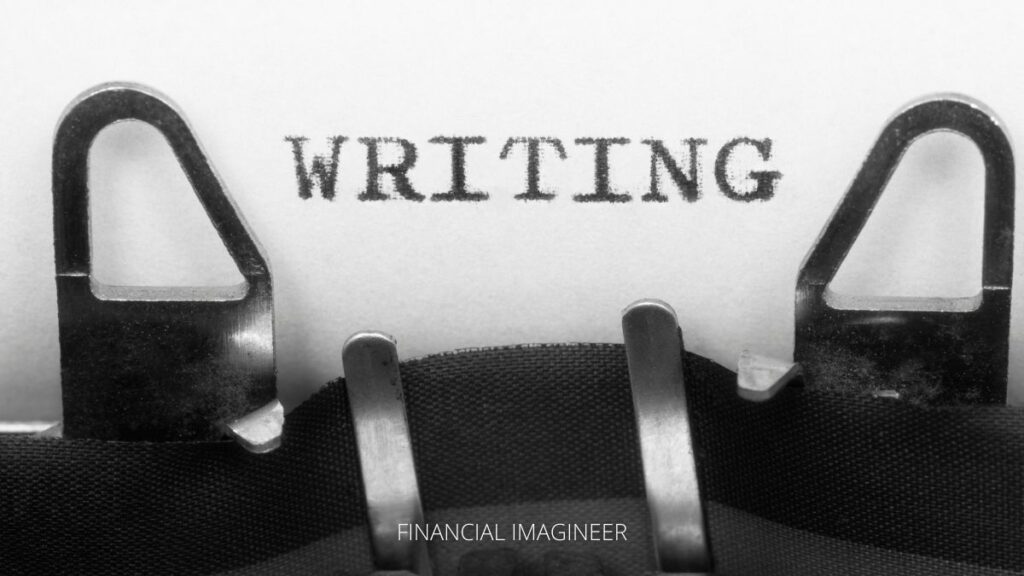Writing is a skill that you definitely need to learn. If you like to learn more about how to become a better writer, this blog post is written just for you!
We will explore how writing can be learned and how it can even become a highly valued skill.
The first part of this article will cover why writing well matters, as well as how it can be acquired if one has not been taught by an expert. In the second part we will go into detail about how one can write better from learning how to put thoughts down on paper, through storytelling and various other techniques, all the way up until perfection.
This is the third article I’m writing together with my good friend Mike from the Distill Academy. Our goal is that after reading this post, you’ll understand all basic things about why learning how to write matters and you’ll have some structure to go about acquiring this skill on your own!
Why Should You Care About Writing Well?
Your ability to write well dictates two things:
- The size of your audience
- The amount of money you make
People buy stories. It’s why you watch movies and buy Apple products.
A moving story will move you to tears, make you root for someone, and push you to believe in a brand.
Good writing that stirs emotion gives you the key to people’s hearts.
If you strike the heart, you can sell anything.
Some of the best writers write about what they’ve experienced in real life. Readers can tell!
“Either write something worth reading or do something worth writing.”
Benjamin Franklin
“But I am not a writer.”
Don’t sell yourself short.
Start to recognise yourself as a writer.
Do it now!
Have you done it?
Cool, let’s move on.
“A writer is someone for whom writing is more difficult than it is for other people.”
Thomas Mann, Essays of Three Decades
What do these contents have in common?
- Emails
- Tweets
- Sales copies
- Blog posts
- Text messages
- Newsletters
- Video scripts
- Instagram captions
- Facebook statuses
They all begin with [!] writing.

You’re a writer even if you send a simple text!
Now that we’ve got this out of the way, let us show you how to write well with just a few adjustments to your writing.
Start with a Purpose
What’s the one objective of your writing?
Make that objective clear to yourself and your readers.
Decide on your intention before writing anything or risk sounding unfocused. Nobody likes to read a person’s ramble.
What’s your primary objective?
Choose one:
- Inform
- Inspire
- Persuade
- Entertain
Your primary objective guides your writing, it’ll decide what you emphasise on and how you order the structure of your piece.
You can have multiple objectives but the one main idea must shine through your words. Your inspiring tweet can be entertaining, but it must first inspire your reader.
Tune These 4 Dials to Write Better
Want to write better instantly?
You just need to work on these 4 dials:
- Clarity
- Simplicity
- Elegance
- Evocativeness
A quick note: You can’t max out all 4 dials. Balance is the key and your primary objective will tell you what you need to tune up and what to tune down.
Read on to find out more about each dial and how to add each element into your writing.
1. Clarity
When you write clearly, it’ll be easier for your readers to understand you.
Your sentences will become sharper as you remove any word that obscures your primary objective.
Unclear writing conveys an undecided mind and hurts your authority in your niche. It screams, “I don’t know what I’m talking about.”
How do you add clarity?
Remove the haziness and don’t make your readers guess what you’re trying to say.
Connect each cause and its effect closely. Your readers shouldn’t need to connect the ideas themselves, they’ll get tired from reading.
If A did B to achieve C, don’t reshuffle the order and add D and E in between before you get to the point.
Example of unclear writing:
I woke up with a headache. It’s Sunday. This will make me very unproductive today. The sentence is unclear because the reader cannot be sure if it’s the headache or the Sunday that’s making me unproductive
Do this instead:
It’s Sunday, I will be unproductive today because I woke up with a headache.
Murder all ambiguity in your writing
Clarity is getting to the point, so get to it.
What’s the point you’re making?
Shine a spotlight on it.
This is where you make your primary objective of the writing loud and clear.
2. Simplicity
You give life to your writing when it’s simple to read.
Simplicity adds punchiness and pace to your writing. Your readers will be able to read from the beginning to the end without stopping.
How do you add simplicity?
Keep your writing tight. Do that by being economical with words.
Avoid jargon and don’t use pretentious word. Good writing doesn’t require unnecessary words.
You don’t need to use a word just because you think it makes you sound smart.
You’ll dilute your message if you try to impress.
Use words your readers will understand. Don’t talk down to them, talk straight with them.
Use simplicity to make your writing more honest and sincere. Nobody likes a pompous prick.
Slash these words from you writing if they are:
- Redundant — E.g. sum total, sum and total mean the same
- Long when they can be short — Utilise = use, inform = tell, numerous = many
- Repetitive — Avoid repeating the same words if you don’t need to
3. Elegance
When your writing has order and flow, it is elegant.
Elegance in writing happens when you arrange and structure your words with care.
Don’t mess your writing up with randomly placed paragraphs and words.
How do you add elegance?
Sketch an outline for your writing.
One point should connect and build up to the next in a way that makes sense.
People read with their eyes; begin a new paragraph whenever you’re shifting emphasis.
Keep one paragraph for each point you’re making.
Be strategic about where you use your punctuations. Don’t use a period when you should use a comma. Short sentences help to make your writing punchier but don’t be afraid to use commas when you need.
Read your writing aloud to see if it sounds rhythmical.
Good writing has a good tune to it when you read it out loud.
That’s elegance.
Don’t just write words, write music.
4. Evocativeness
Evocativeness is the salt to your writing.
It’s the last piece of the puzzle that completes the picture.
After improved your writing, be simple, clear, and elegant. You add flair to your writing with evocativeness. This way, you stimulate your readers with flavours and spices added to your words.
How do you add evocativeness?
Arouse your readers’ senses and paint a vivid picture with your words. Don’t just tell them a story, bring them into your world crafted by your words.
By adding evocativeness into your writing, you have the power to fire up imagination and stir the emotions of your readers.
Remove sameness from your writing and add variety.
If you’ve been using active sentences for a large part of your writing, a well-placed passive sentence will keep your readers engaged.
Simplicity, clarity and elegance sets you up for success, evocativeness is your weapon to capture the heart.
Have a Genuine Desire to Connect with Your Readers
Readers know when you care deeply about them when you write.
Think: What will they get out of your writing?
Have you made your points clear and simple enough for them to understand?
Are your paragraphs arranged logically?
Do your words arouse your readers’ emotions?
I can give you all tools and tips to write better. But none of the writing tools will matter if your readers sense insincerity in your words.
Your desire to connect with your readers must be genuine.
Don’t alienate your readers with insincerity.

How do you keep your Sincerity in check?
Read your writing back to yourself.
Do you sound authentic or pompous?
Do you believe the words you wrote?
Read, read and adjust accordingly.
Read from the eyes of your readers and with an open heart. Then, you will know what to keep and what to leave out.
Enjoy Writing
You will find writing a pleasant experience as you improve. Keep writing until you fall in love with the process.
Don’t be obsessed over perfection if time doesn’t allow it. Like life, writing is about consistent refinement and not perfection.
When you start writing your next tweet or email, do this:
- Have a clear primary objective
- Tune your 4 writing dials
- Yearn to connect with your readers
Relax.
You got this. Go write well and connect with people’s hearts.
Let your readers know why your story matters to them. Show them how you can be of service. Tell a story so moving that they have no choice but to buy your products.
Observe yourself, find a quiet place, an inspiring location or method to get you into your writing mood!
Most of all, stir their emotions with honesty.

Conclusion
As a father of two, I can observe how my kids learn how to write. This is very insightful and highly valuable for myself. It sharpens my senses and lets me reflect about how I learned to write myself.
“Writing [books] is the closest men ever come to childbearing.”
Norman Mailer
In my opinion, writing well boils down to how you present yourself.
If you’re a good speaker or talker, chances are that you’ll be a good writer as well.
All you got to do is to find your voice and write content the way that comes naturally to you.
You should always try to convey authenticity in your writing because it is an art of communicating with others so they understand what we mean by our words on paper.
The best writers can do this effortlessly while some struggle for years before finding their true selves through the process of being genuine and connected with their readers.
Find out who you are writing for, who’s your audience, why they are reading your content and what they hope to get from you. Be yourself and stay in line with your voice, you’ll write persuasive, engaging content. If whatever you put down is also useful, informative and valuable, you’re on a good way to master the skill.
“We write to taste life twice, in the moment and in retrospect.”
Remember, it’s never been a better time to be a writer – or aspire to become one.
Sometimes I simply write in order to discover how much I truly know.
If you like to read more about writing better, click here and read on!
Writing is about consistent refinement not perfection – enjoy!
Distill Skills and Imagineer your Life!
Mike and Matt
If you didn’t join my inbox crew yet consider subscribing by email in the box below, like my Facebook page or follow Financial Imagineer on Twitter.
Disclaimer: Please be informed some of the above links are affiliate links. Financial Imagineer could receive a compensation if you click or buy anything through this page.

This inspired me to start writing. Something that I have been meaning to do for the longest time. Also as a reflection, diligently pursue things that I want to better myself at. By working on them EVERY SINGLE DAY. Thanks for inspiring and good luck with your writing!
Dear Vishnu,
Happy to read you’re planning to get started with writing!
Just do it.
Start and improve your writing on the go.
Wish you all the very best on your upcoming journey!!!
Matt
That was well written and full of great info. I agree that good public speakers are often very good writers as well. Both require you to catch the audiences attention, to draw them into emotional involvement with your content. It requires empathy with your readers. I love the idea of evocativeness. I had never thought about that but it is so true.